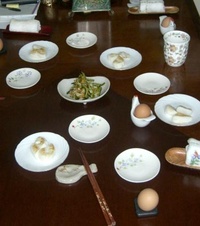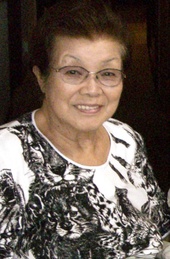Read Part 1 >>
Sensei’s eldest son, Fumiyasu, 61, is now the official head of the clinic, carrying on in traditional fashion. Her two other sons are also doctors: Yasuo is a dentist in Tokyo and Hiroshi has his own clinic in Saitama. However, the future of the women’s clinic is an uncertain one as there are no grandchildren in line to carry on the legacy into a third generation.
The unobtrusive, beige-tiled clinic is located in the remarkably tight and well ordered downtown area. The beige Mercedes S-class car is squeezed precariously on to a bit of sidewalk. The large plastic and black lettered schedule affixed to the main entrance has the hours and days of operation. As a women’s hospital, the number of patients has plummeted along with the national birth rate, sensei points out. Fumiyasu lives in the same building with his wife and son, both of whom I have never met and who even Akiko has only met on rare occasions.
* * *
There is a quiet order to our routine. While we are guests, sensei is the one who is in clearly in charge: we eat according to her schedule but menu is modified to meet our wants and special treats like sasa kamaboko, sashimi, sweet white fleshed peaches and other delicious fruit compliment every meal. Even at her age, she keeps a remarkably busy schedule: she is driven to her nearby clinic twice a week to do paper work, attends conferences, writes papers, gives talks at local schools and welcomes a steady stream of visitors, one of whom is a female Korean doctor who she helped during her studies in Sendai.
At the dining room table, Sensei patiently explains certain episodes during her life with the remarkable patience of one who has been doing so for more than 60 years. I am conscious that my questions might traverse cultural boundaries of personal privacy and better-kept family secrets and so hedge them.
Sensei recalled the waning months of World War Two and recalls with some vividness the bombs that fell on Sendai and going to the Hirose River to seek refuge from the flames that were all around her. I can see her young self flee in her white lab coat from the Tohoku University Hospital to the nearby river with her fellow young doctors, the burning flames consuming the wooden homes and buildings around the train station. I have rarely spoken to my Japanese friends about their family’s wartime experiences. Maybe this is a generational taboo as even in Canada I rarely ever have the opportunity to talk with Nikkei of my generation about common family’s experiences. I can’t help but feel that our memory of pre-World War Two and internment experiences are moving to a quickly approaching vanishing point now, as if our collective experiences as an immigrant community had never happened.
Back in Sensei’s dining room, I watch the atomic bomb ceremonies from Hiroshima. Even after having lived in Japan for nine years, the anniversary always arouse deep feelings; it always perplexed me that there weren’t large ceremonies of remembrance outside of Hiroshima or Nagasaki and that there was the absence of any bad feelings, at least on the surface, by young Japanese whose grandparents and elderly relations most certainly have wartime memories too. In Canada, we rarely ever consider the devastating effects that the war had on the civilian Japanese population that suffered greatly from starvation, the bombing of their cities and the consequent loss of family members.
Even though she is confined to a wheelchair (losing a leg above the knee due to diabetes), Sensei continues to work as a volunteer councilor and to work for reproductive health rights in Japan. For her work to further Japanese women’s social causes, Dr. Nagaike has received the Matsumoto and Yoshioka awards as well as special recognition from the City of Sendai for her work.
“Officially in Japan there is equality between men and women,” she points out, “but in fact it is not consistent with the reality of everyday life here. In general, men, especially those in positions of power still lack the degree of gender sensitivity and deep desire to really change women’s position in society that is necessary for true gender equality to be realized.”
* * *
Since returning to Canada, Sensei has undergone radiation treatment for lung cancer but still continues her active lifestyle with regular visit of friends, masseuse, housekeepers and a phone that rings constantly; she is never want for company or things to do. Akiko’s mom, Ayako, continues to be her constant companion and friend as she has been for more than 60 years.
The remarkable life of Dr. Hiroko Nagaike is one that I feel deeply fortunate to have gotten to know.
© 2010 Norm Ibuki







